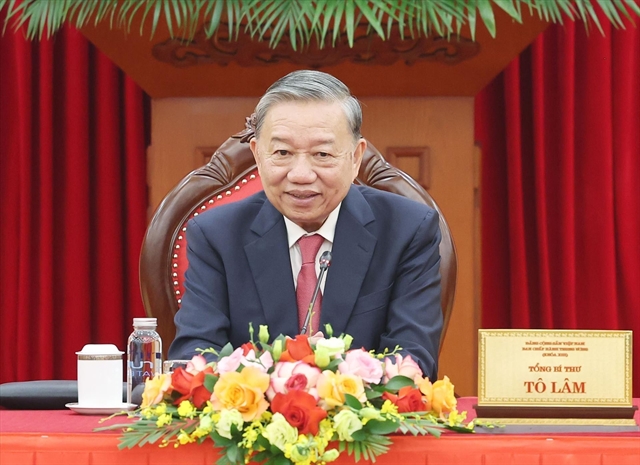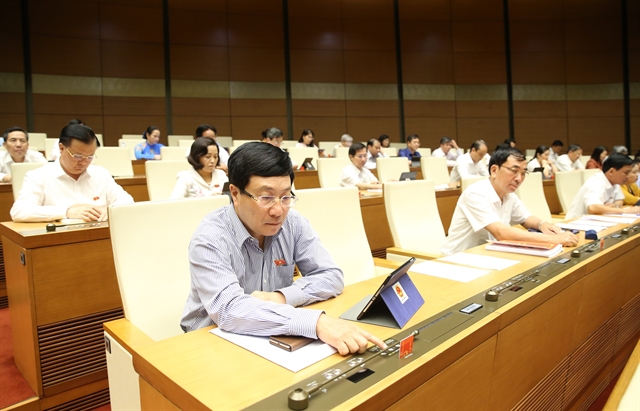 Politics & Law
Politics & Law


|
| National Assembly deputies vote to pass the Youth Law. — VNA/VNS Photo Dương Giang |
HÀ NỘI — Legislators voted to pass a law on mediation and dialogue at courts during the ongoing ninth session of the 14th National Assembly in Hà Nội on Tuesday.
With 90.27 per cent of votes in favour, deputies agreed to review and adjust the law.
The law prescribes the State’s principles and policies on mediation and dialogue at courts, the rights and obligations of mediators at courts, the courts’ responsibilities, and mediation and dialogue procedures.
On the same day, the NA passed the draft revised Youth Law with the support of 91.3 per cent of deputies present.
The revised Youth Law covers Vietnamese citizens between 16 and 30 years of age along with agencies, organisations, individuals, schools, and families.
It regulates youths’ rights, obligations and responsibilities, State policies towards the youths, the responsibilities of agencies, schools, families, individuals, youth organisations, and other organisations towards youths, and State management of youths.
Earlier, Chairman of the NA’s Committee for Culture, Education, Youth, Adolescents and Children Phan Thanh Bình delivered a report on amendments to the draft revised law, saying the bill was amended in a way that institutionalises the Party’s viewpoints and guidelines and the 2013 Constitution’s articles on youths.
It lacks detailed regulations on youths’ rights and obligations in each field to avoid overlapping with other laws, Bình said, noting that to emphasise youths’ role in national development and defence, the bill reserves one chapter for stipulating their responsibilities towards the Fatherland, the State, their families, society, and themselves.
The draft amended law also regulates State policies on youths, along with the responsibilities of agencies, organisations, schools and families towards them, so as to create a favourable legal corridor for the young to meet their responsibilities.
There is also a chapter on State management, according to Bình, assigning tasks to the Government, ministries, ministerial-level agencies, and local authorities to ensure conditions exist for youths to exercise their rights, obligations, and responsibilities.
Law on Residence
National Assembly (NA) deputies have agreed it was necessary to further ensure citizens' rights during a discussion on the revised Law on Residence on Tuesday.
The deputies said many citizens now live and work far away from their permanent registration places and are not eligible for registration at the current address, causing problems for the management of residence.
Meanwhile, there are many regulations in the declarations of temporary absence or residence which cannot be completed online causing inconvenience for citizens, they said.
Deputy Lê Quang Trí from the Cửu Long (Mekong) Delta province of Tiền Giang proposed the application of science and technology in residence management, including the investment building a national database on residence using information technology in which information can be shared between state management agencies for the convenience of citizens.
“Citizens will not be required to apply for a residence permit to apply to other agencies,” he said.
Deputy Ngàn Phương Loan from the northern province of Lạng Sơn stated there were many cases of illegal exit to foreign countries, people residing for many years in foreign countries and even cases of people getting married and having children while abroad without carrying out procedures deleting their permanent registration status, which made it difficult to manage.
“These cases should be subjected to permanent residence deletion,” Loan said. "Except for those who legally leave Việt Nam" distinguishing those who exit legally from those who exit illegally.
Regarding household registration books, the deputies said this was an important basis for organisations and individuals to conduct civil transactions such as buying and selling electricity and water, registering telephone services. When there is no household registration book, the implementation of transactions may be difficult, they said.
The deputies urged that there should be regulations to provide and share information and data on residence among state agencies. The exploitation of information from the database on residence of organisations and individuals should be prescribed in the direction to create favourable conditions for citizens when it is necessary to use information on personal identification, permanent residence and temporary residence in the databases. — VNS